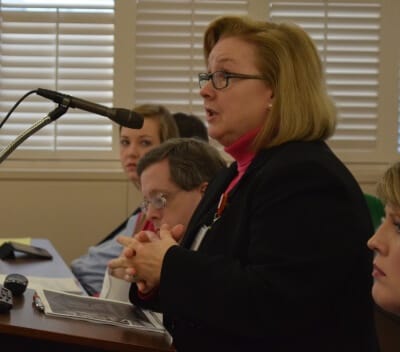

In light of the recent discussion and review of mathematics standards in North Carolina, we feel it is important for the voices of mathematics educators be heard. We represent NC mathematics education organizations and individuals with considerable expertise in the issues at stake. We applaud the Academic Standards Review Commission (ASRC) decision on December 17 not to replace the current standards and are committed to join any effort to improve the quality of these standards for the benefit of our students, teachers, and stakeholders. We have three critical observations in response to the report of the ASRC mathematics working group and the subsequent comments by ASRC Co-Chair, Tammy Covil, reported in the N&O on December 30.
First, contrary to the statements by the mathematics working group and Co-Chair Covil, teachers using the North Carolina Standard Course of Study for Mathematics have responded favorably. A summary of 554 K-8 survey responses in their report’s appendix shows that 69 percent of teachers believe that the NC Math Standards do not limit their flexibility, 76 percent believe they have appropriate support to teach the standards, and 64 percent believe they can translate them into instruction. In a survey conducted by the Department of Public Instruction (DPI), 3,069 educator responses to the K-8 surveys indicated that 96 percent of the standards had an approval rating of 80-100 percent; of the 923 HS educator responses, 89 percent of the standards had approval ratings above 70 percent. Together, these K-12 data indicate a much wider level of support for the current standards than represented by the mathematics working group.
Second, the mathematics working group recommended that NC adopt Minnesota’s State Standards, citing results on the 2015 National Assessment of Educational Progress (NAEP) administration. This recommendation lacked sufficient consideration of the differences in the overall economics, demographics, and educational histories of NC and MN, all of which significantly affect student achievement. Though MN’s overall 2015 mean NAEP score for fourth-grade was six points higher than NC, Black, Hispanic, Asian, Native American, and students of two or more races in NC all outscored their counterparts in MN. Further, NC serves many more children with economic need: 60 percent of NC fourth-grade students are eligible for free-and-reduced lunch as opposed to 40 percent in MN. Minnesota spent $10,686 per student in the last common reporting period, almost 30 percent more than the $8,306 that NC spent. Finally, the duration of implementation of a clear set of standards has been linked to high performance, based on testimony given to the ASRC. While MN has been implementing their standards since 2010, NC began implementing our standards in 2012. In summary, one state cannot simply implement another state’s standards and expect to match its outcomes.
Third, the mathematics working group delivered a report that was confusing, filled with inaccurate descriptions of the standards, and lacked sufficiently rigorous analyses, as documented in the North Carolina Council of Teachers of Mathematics’ response to mathematics working group’s interim report and in other letters to the commission. The group’s proceedings repeatedly exhibited a lack of transparency, an unwillingness to consider multiple points of view, and a refusal to allow anyone who did not share their opposition to the Common Core to participate. Their meetings were poorly advertised and did not follow state-mandated open meeting requirements. Finally, the allegation by ASRC Co-Chair Covil (and mirrored in the working group report) that individuals at DPI are profiting financially from maintaining Common Core is without merit, without documentation, and reflects a lack of professionalism.
In conclusion, there is little evidence to suggest that NC should abandon its commitment to implementing its standards for mathematics, provided the existing process of periodically and rigorously reviewing standards is conducted carefully with regard to data, and the state devotes resources necessary for a successful implementation by our teachers.
Signed,
Organizations:
Board of Directors of the North Carolina Council of Teachers of Mathematics
Officers of the Association of Mathematics Teacher Educators – North Carolina
Individuals:
Jere Confrey, NC State University and Member, CCSS National Validation Committee
Timothy Hendrix, Meredith College
Ron Preston, East Carolina University
Michelle Stephan, UNC Charlotte
Holt Wilson, UNC Greensboro
A version of the following letter appeared in the News & Observer. It is reprinted with permission of the authors.




